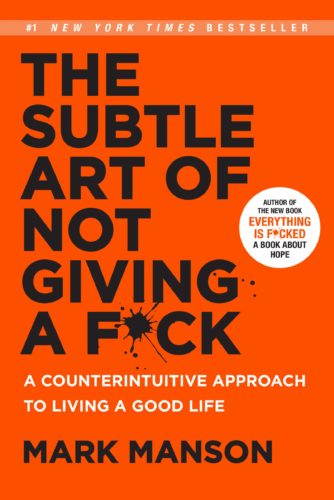Do you ever get irritated at somewhat trivial things, like dead TV remote batteries or that too-short traffic light by your house? Most readers may offer a guilty smirk at this moment, but the uncomfortable truth is that most of us struggle with similar irritations each day. Negative, unproductive reactions can be controlled — even eliminated! — by caring less. Become more confident in your decision making by not letting unimportant things weigh you down.
And that’s the advice from Mark Manson, author of The Subtle Art of Not Giving a F*ck, a book that supports a rather counterintuitive approach to life (if you hadn’t guessed from the title).
Manson delivers a breakdown of the areas where we might care too much. He highlights the power of perspective and choice, and explains how the two work together to transform your mindset into one of confident choice and exclusion.
 Get comfortable being uncomfortable
Get comfortable being uncomfortable
One of Manson’s first pieces of advice about caring too much is “Not giving a f*ck does not mean being indifferent; it means being comfortable with being different.”
Indifference is negative, detached behavior — not the behavior of a normal, emotional human. So don’t be indifferent; embrace the positives and advantages your differences create. And by embracing them, you’ll need to embrace not being liked by everyone — and that’s ok! Because as Manson says, “You can’t be an important and life-changing presence for some people without also being a joke and an embarrassment to others.”
Getting comfortable in your differences brushes off adversity in the face of career goals and communicates confidence.
Ask yourself the right hard questions
Looking yourself in the mirror and telling yourself hard truths is common advice for people hungry to change their outlook on life. But the questions about what you want, and how they are asked, make for some boring and cookie cutter answers.
Think about it: everyone wants to be happy with a fulfilling, well-paying job and loving family and friends. And even boiling it down to more specifics from that don’t generate much progress.
Instead of asking yourself what you want, ask yourself “What pain are you willing to sustain?” Any path forward certainly includes pain and problems and asking yourself this question will change your perspective. Are you willing to put in the pain your goal requires, and enjoy the process?
Ask yourself the hard questions to spark some exploration and thought about what you’re willing to do. It’ll certainly lead you to powerful conclusions about what you need to cut out, improve on, and invest in.
Know what to reject
Another common piece of advice is to be open-minded and embrace new opportunities. Say yes to everything! But the desire and urge to be open and attack new opportunities prioritizes short-term pleasure at the cost of long-term confidence and happiness. In short, we need to say no to something!
Rejecting things that are poor fits will help you calibrate and decide what matters most to you — while also clearing up some time and energy for you to focus more on those exact things. Instead of overtaxing yourself and trying to balance everything equally, reject things with confidence, knowing the impact it has on your long term future.
See what other books are on our shelves!









